Chosen Family and Chosen Ancestors
In the spring of 2024, a Friend approached us during the First-day coffee hour at FMW, Friends Meeting of Washington (D.C.), and exclaimed, “FMW needs a queer meeting!” To which one of us replied, “FMW needs a queer meeting again.” In April of that year, we revived the worship group and held our first meeting, re-energizing a spiritual tradition in Washington, D.C., that dates back to 1979. Since then we have met monthly (and recently, twice monthly) on Fourth-day evenings for worship, afterthoughts, and the best homemade baked goods you’ll find in any Quaker meeting anywhere. We call this, simply, “Queer Meeting.”
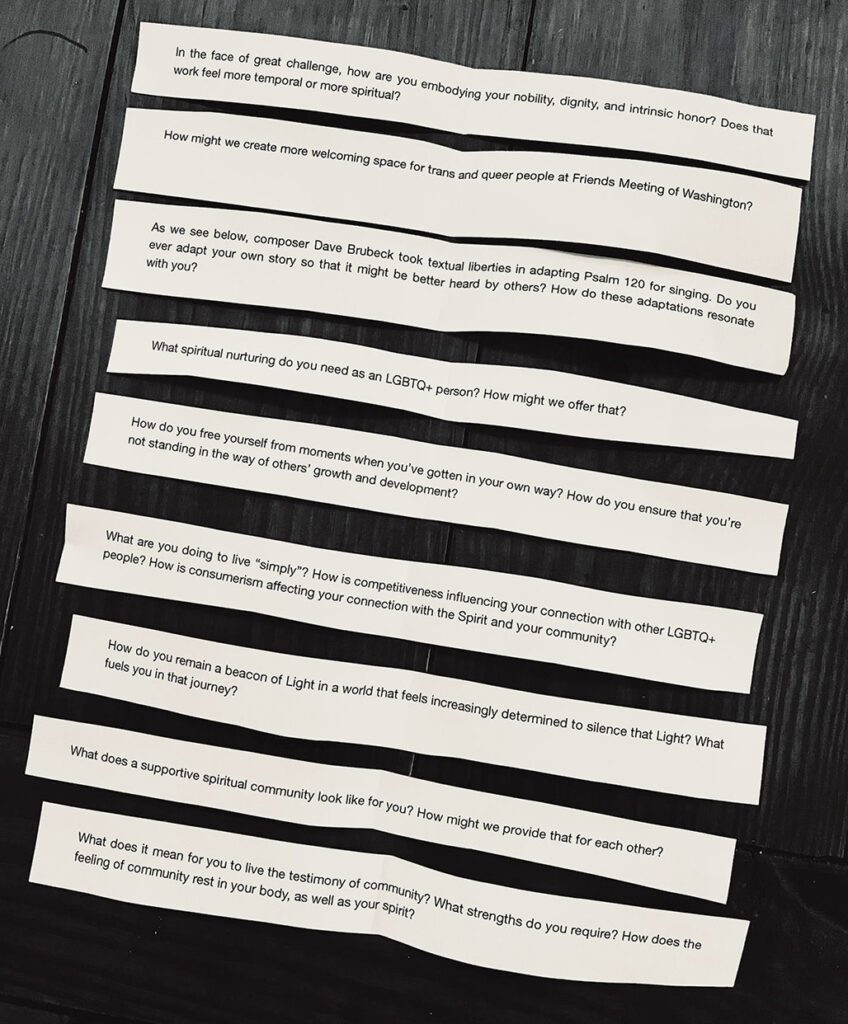
A Responsibility to Our Past
In early May, we held a camping retreat at Opequon Quaker Camp on the lovely Rolling Ridge Conservancy in West Virginia. At the worship that closed out the weekend, we were joined by a Friend who now lives on the conservancy and who, about 30 years ago, had lived for over a decade in Washington, D.C. That Friend sat down before worship began and noted how delighted he was to join us, as the original queer meeting at FMW had been a highlight of his time living in Washington. He beautifully described the room in which the worship was held—the same one we use today—and his journey after leaving D.C., which, these many years later, led him back to our midst, or perhaps instead led us to his presence!
There was a time when FMW was one of the few places in Washington where memorials could be held for someone who had died of AIDS. FMW hosted an anonymous Saturday evening coffeehouse for people with HIV and AIDS in the 1980s and 1990s, allowing those Friends a place of safety, respite, and community building. The First-day gay and lesbian worship moved into the meetinghouse in the early 1980s, and in the late 1990s, it finally began happening concurrently with FMW’s main First-day worship in order to allow for a shared coffee hour and shared business meeting. At one point in the early 1990s, the queer meeting would sometimes draw over 100 Friends each week. Yet as the group entered this century, numbers dwindled, and the group became a meeting with a “special welcome” for LGBTQ+ people and was known mainly for being small and relatively silent. That group eventually lapsed as the COVID-19 pandemic took hold.
Today we have Friends from the original group who attend the revived queer meeting; they are now in their 70s and 80s. They speak of the pain of watching hundreds of their friends and acquaintances die at the height of the AIDS pandemic. Those elder Friends speak of the joy they find in our worship group, and especially enjoy being in an intergenerational gathering that at an earlier point in time seemed impossible.
These pains are specific to trans and queer experiences, and by centering those voices in a dedicated meeting for worship, we are able to attend to those pains in a manner that speaks to our condition.
Why Here and Why Now?
If you walked into FMW on a First-day morning, you might notice that it is largely, and perhaps conspicuously, queer. At least a half dozen of our committees are clerked by openly LGBTQ+ people, and the meeting as a whole has been clerked by queer people on several occasions over the last 30 years. And yet, in a community that already offers five different worship opportunities each week, why one more? And why explicitly queer?
Put simply, our worship group is serving a particular spiritual need that other meetings in FMW’s care are not serving. The work of the LGBTQ+ worship group is both spiritual and pastoral. While we need, value, and appreciate the love and care that FMW provides, we are also led to attend to a certain set of needs that explicitly stem from our identity. Within our worship group, there is a nearly universal experience of deep-seated religious trauma, all of which occurred in spiritual spaces dominated by heterosexual voices across a wide spectrum of Christian traditions. Particularly in 2025, there is genuine fear among our attenders—especially trans and gender non-conforming Friends—that violence is coming for them. One Friend challenged us in afterthoughts recently: “In a period when many are being crucified, how will we take those innocents down from their cross?”
Living in and near D.C., the news of the day is always hard to escape. The present federal administration openly and gleefully pursues efforts to legally erase transgender people and their healthcare, to scale back HIV prevention and care, and casually threatens to send its enemies (of which queer people are certainly a part) to foreign prison camps. These pains are specific to trans and queer experiences, and by centering those voices in a dedicated meeting for worship, we are able to attend to those pains in a manner that speaks to our condition. For better or for worse, these are experiences to which our straight Friends at FMW—no matter how loving or well-intended—don’t really understand firsthand.
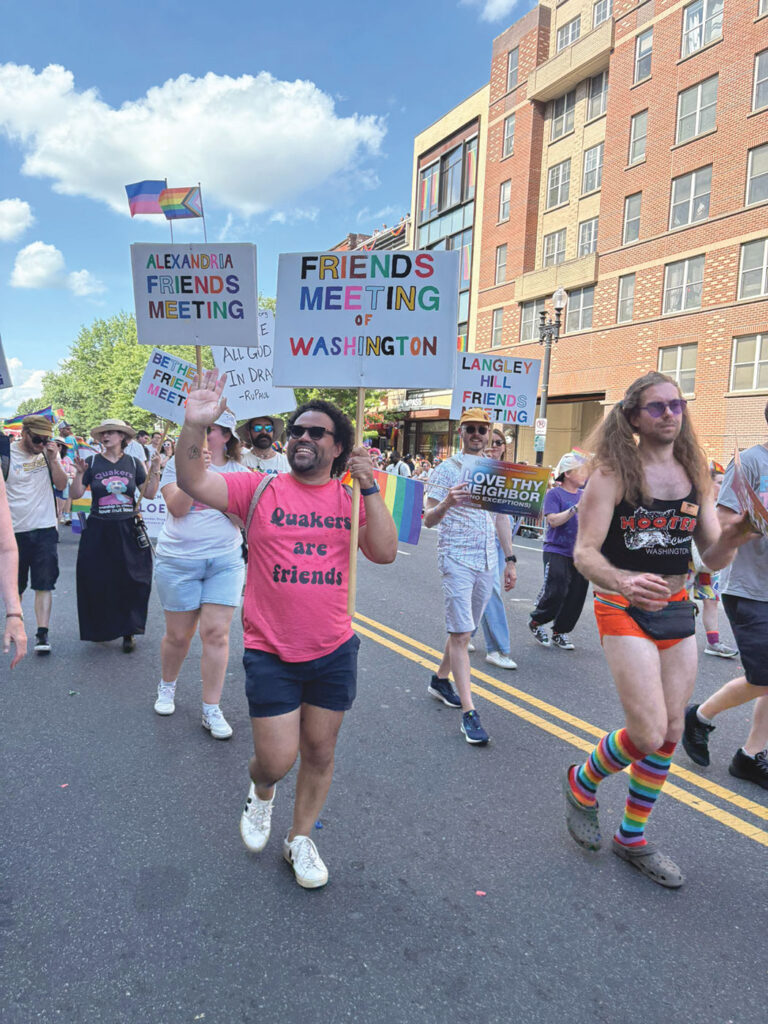
Centering Queer Joy
At our first meeting of the revived group in April 2024, we set out a circle of chairs, expecting the small handful of people we had invited through individual conversations. As the meeting continued, we were joyfully disrupted again and again as Friends unexpectedly joined, requiring us to literally expand our circle. In the afterthoughts that followed, many expressed a shared experience as “religious refugees,” having been discarded from other traditions. Through continued discernment, they had identified Quakers as an affirming community. The meeting of a queer group within that community, which is advertised on the website and in weekly email announcements, was seen as an explicitly inclusionary act of welcome. Even in traditions that claim inclusivity, such welcome is not always voiced or can feel hollow. Many newcomers have discovered the queer meeting through the FMW website. Those Friends felt safer testing the waters of their new or renewed religious practice within the self-selecting queer group first, before perhaps entering the broader community and First-day meetings. Our conversations in afterthoughts have allowed for rich spiritual connections within our group, as we hold space for both fears and joys.
After a year of discerning what this group means to each of us and how to proceed, we reached clarity on the desire for a second gathering each month. More than a year into our revived worship group, we still find ourselves interrupted by the arrival of our largest number of queer attenders yet, expanding the circle ever wider.
One of our most resonant queries in the last year was: what do you carry that carries you? That inquiry helped us to understand that our burdens may also be a source of our strength.
What Do You Carry That Carries You?
At first, we created handouts with queries seeking what this community might look like and how Friends wished to proceed. We intended to set these queries aside after our first few meetings as the community solidified; however, Friends spoke out strongly in favor of the prompts. The handouts grew to incorporate quotes from queer poets, activists, and artists across generations and cultures. Many found that a brief excerpt—some Friends might even think of these as “advices”—and a guiding query were helpful to quickly settle into a midweek meeting that might otherwise be occupied by thoughts of the workday and commute. Others who don’t find the query helpful are always welcome to worship as they are led. Some have found that developing the next set of prompts can be a generative and rewarding spiritual exercise in itself.
During our early summer camp gathering, all the queries from our prior meetings were placed in an envelope before worship sharing. Friends went around the circle pulling out a random query to reflect upon. A few noted that their initial draw felt difficult for them, so they drew another. For some, the second query reinforced the first, and made those Friends realize they were being led to grapple with something. For others, their two queries were pulling them in opposite directions, and those Friends reflected upon how they were led to bridge the two.
As many Friends have found over the last four centuries, centering our worship firmly in the tradition of seeking has led to intensely gathered meetings. We are led to listen deeply to Spirit and to each other, assisted by a sense of shared understanding and experience among us. One of our most resonant queries in the last year was: what do you carry that carries you? That inquiry helped us to understand that our burdens may also be a source of our strength.
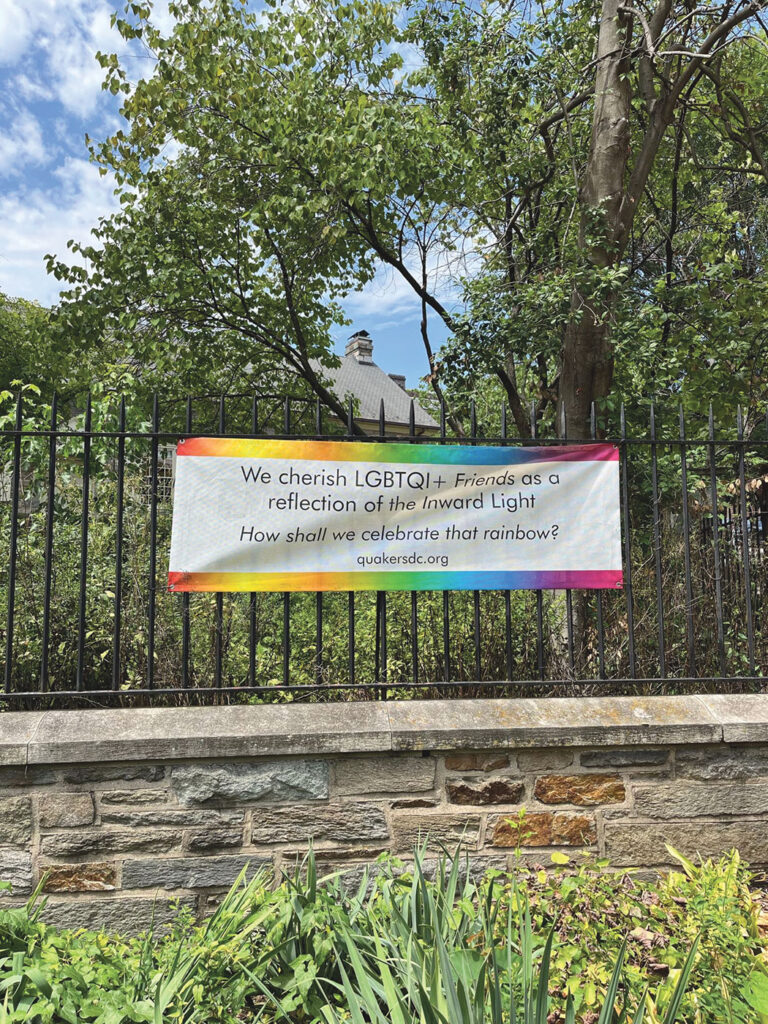
Chosen Family and Chosen Ancestors
The FMW Queer meeting has tapped into and grown a stunning chosen family, reflecting many beautiful facets of our local queer communities. Many of our attenders, however, also note appreciation and affinity for our chosen ancestors: those Friends 40-odd years ago who started forging spiritual community in the face of incredible peril. We are indebted to the many Friends of that era who did not survive, and we are immensely grateful for those Friends in our midst who did. These chosen ancestors have inspired poems, songs, and podcast musings written by our community. At our first Pride Month worship this year, a weeping Friend shared, “This meeting makes me a better person. Your queerness makes me a better person.” As trans and queer people face renewed enmity in this world, a safe and welcoming spiritual center is imperative to our survival.


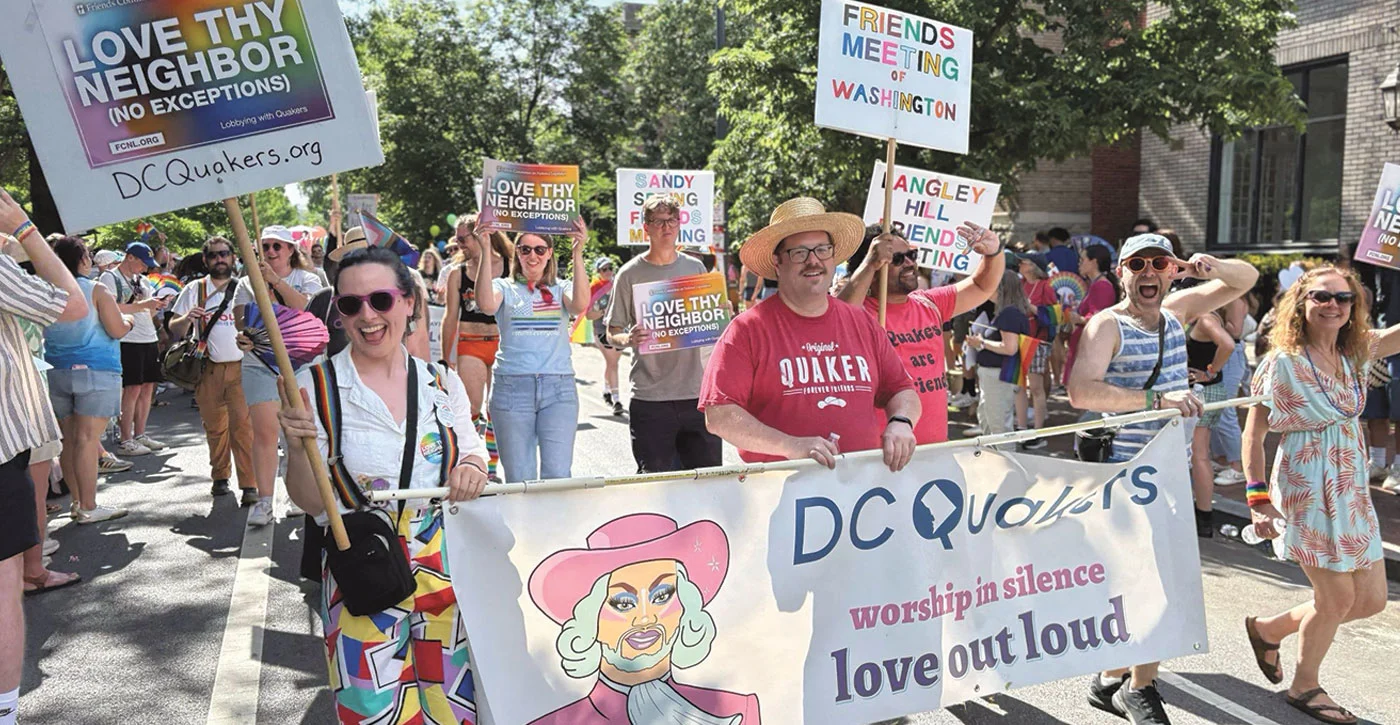
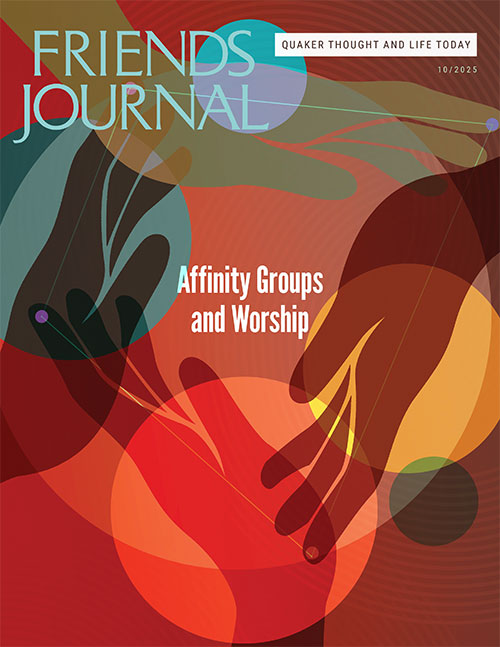
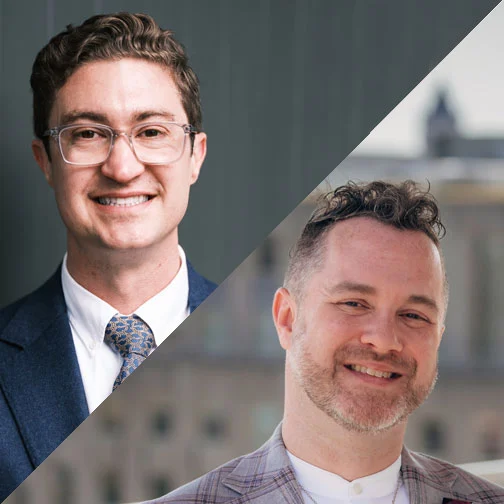
Comments on Friendsjournal.org may be used in the Forum of the print magazine and may be edited for length and clarity.